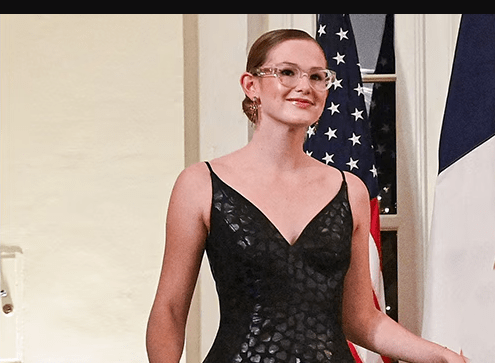Violet Affleck has been more well-known in recent months, not as the daughter of acclaimed actor Ben Affleck and adored actress Jennifer Garner, but rather as a fervent supporter of juvenile health around the world. During Climate Week, her voice—which was particularly calm and crystal clear—echoed through the UN’s chambers, raising the straightforward but urgent issue that dominated headlines and online discussion: Is Violet Affleck ill?

There is no basis for the worry in conjecture or paparazzi gossip. It comes straight from what Violet herself said. At a U.N. event called “Healthy Indoor Air: A Global Call to Action,” Violet gave a powerful speech in which she discussed the long-term effects of airborne sickness, namely COVID-19, as well as her personal experience with a post-viral illness. Her message gained uncommon genuineness as a result of this revelation. A generation forced to grow up in the long shadow of pandemic neglect is vividly depicted by her activism, which is driven by personal suffering and supported by evidence.
Violet Affleck – Personal and Public Information
| Category | Details |
|---|---|
| Full Name | Violet Anne Affleck |
| Birth Date | December 1, 2005 (Age 19) |
| Parents | Ben Affleck (father), Jennifer Garner (mother) |
| Education | Yale University (currently enrolled) |
| Nationality | American |
| Known For | U.N. speech on indoor air and long COVID, youth health advocacy |
| Public Health Role | Clean air and post-viral illness awareness advocate |
| Personal Experience | Suffered post-viral condition in 2019 |
| Reference |
Violet suffered a life-altering post-viral sickness in 2019, years before most teenagers were thinking about masks or air purifiers. Her early experience with an invisible, crippling illness exposed her to a vulnerability that cannot be explained by statistics alone. She is currently 19 years old, a Yale student, and has used that experience as a springboard for her advocacy, successfully presenting filtered indoor air as a human right. In addition to being quite creative in how it was framed, her speech was also very effective at advancing the global dialogue.
Violet didn’t only speak for herself when she gave her speech. She cited the stories of many children who already suffer from long-term COVID, which she estimates has already surpassed asthma as the most prevalent chronic illness among young Americans. This statement, which was made with obvious displeasure, was significant because it was true. The World Health Organization estimates that about 6% of adults have post-COVID problems. That figure jumps to a staggering 10–20% for kids and teens. These numbers now reflect a fast expanding demography and are no longer only theoretical.
Instead of immersing herself in the story, Violet took a wonderfully successful approach: she became a voice for the tales of those who are frequently ignored—children who are unable to play, have trouble thinking clearly, or deal with everyday pain and exhaustion. Her voice was firm but full of urgency as she stated, “I am afraid for the children who do not or soon will not know a life without debilitating pain.” Violet sounded more like a leader in that moment than the daughter of two movie stars.
Her messaging’s clarity has significantly enhanced her advocacy. She made a strong moral case by referring to aerial protection as “a technology millions would kill for.” The emotion, which was passionately articulated, was a pointed critique of a culture that knows how to avert harm but chooses not to, rather than an adolescent outburst. Not only was her framing audacious, but its reasoning was remarkably robust. Although there is technology and solutions available, implementation is still uneven, especially in low-income neighborhoods and schools.
Violet’s moment of civic prominence puts her in the same line as other young voices that are changing the conversation around public policy. Like Malala Yousafzai’s courageous educational advocacy or Greta Thunberg’s ferocious environmentalism, Violet is using her history as a platform rather than a shield. Perhaps even more fascinating is her readiness to tackle a subject that many people avoid: public health, an area that is frequently controlled by experts who are decades older. Her lived reality and scientific insight broke through bureaucratic politeness, making her presence seem like a necessary disruption.
Naturally, her address sparked a surge in public interest. Search engines were inundated with queries like “Is Violet Affleck sick?”—not because they were obscenely curious, but rather because her appeal seemed intimate. It was, too. By disclosing her early battle with post-viral sickness, she simultaneously emphasized her sensitivity and authority. It wasn’t a moment of star press. A young woman who sincerely cared about her friends’ health made a civic appeal.
Violet’s openness is especially advantageous in that situation. Her straightforward discussion of the long-term effects of airborne sickness has successfully de-stigmatized the discussion of chronic post-viral disorders. These ailments are frequently written off as fictitious or overblown. Violet’s openness, supported by indisputable facts and an emotionally astute tone, has eroded those damaging assumptions.
Additionally, she has demonstrated remarkable adaptability in her advocacy approach. She made an appearance before the Los Angeles County Board of Supervisors in 2024 and urged them to give indoor air quality first priority. She brought the message to the attention of the world at the U.N. Her advocacy is intelligently scaled, with a local foundation and global relevance. This strategy demonstrates both training and desire. Although Yale is honing her academic skills, the foundation seems to be very ethical and extremely personal.
It is important not to undervalue the cultural change she represents. Celebrity offspring have often been linked to fashion, frivolity, or career choices driven by nepotism. That model is upset by Violet’s rise to prominence as a public health champion. She sets a higher standard for what it means to be a public figure in her generation by doing this. Fame for the sake of fame is not the goal. It has to do with responsibility, empathy, and purpose.
